Consequences of Vatican II
 |
 |
 |
 |
 |
 |
 |
Conciliar Church Draws Closer to Freemasonry
Since the progressivist takeover in Vatican II, the Conciliar Church has manifested an unprecedented openness to the world and its false religions. Now, it seems to be preparing a marriage with the longtime enemy of the Catholic Church, Freemasonry.
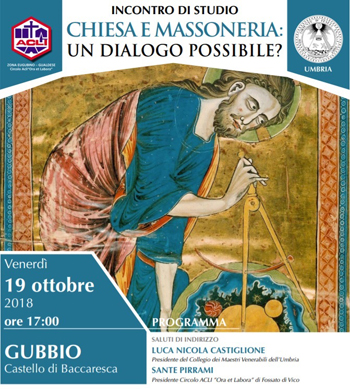
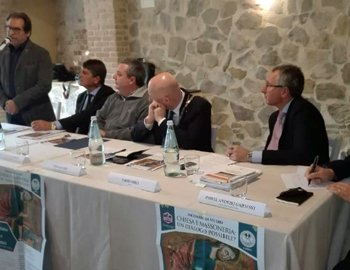 One such instance of this preparation was the letter sent to the Masons by Cardinal Giafranco Ravasi. On February 4, 2016, that Cardinal, who is the President of the Pontifical Council for Culture, published an open and controversial letter titled “Dear Masonic brothers.” In it, he declared that the Church’s past condemnations against Masonry “do not prevent a dialogue” between the two entities, and that the many philanthropic activities carried out by the Masons are praiseworthy.
One such instance of this preparation was the letter sent to the Masons by Cardinal Giafranco Ravasi. On February 4, 2016, that Cardinal, who is the President of the Pontifical Council for Culture, published an open and controversial letter titled “Dear Masonic brothers.” In it, he declared that the Church’s past condemnations against Masonry “do not prevent a dialogue” between the two entities, and that the many philanthropic activities carried out by the Masons are praiseworthy.
It is along these lines that a public conference was held recently on October 19, 2018, at Baccaresca Castle in Gubbio, Italy, in the Province of Perugia. The conference, titled “The Church and Masonry: A Possible Dialogue?” was a collaboration between the Umbrian Masonry of the Grand Orient of Italy (GOI) and the Italian Association of Christian Workers (ACLI), a Catholic organization. Speakers included the Masonic Grand Master Stefano Bisi, President of ACLI Sante Pirrami (from the Fossato di Vico chapter), two local mayors, Waldensian “pastor” Pawel Andrzej Gajewsi and the Catholic representative, Fr. Gianni Giacomelli, prior of the Monastery of Fonte Avellana.
Apparently, this conference met with the approval of the Dioceses of Assisi and Gubbio, manifested by these facts:
• Pirrami stated that all the local Prelates had been informed of the event; this would include Arch. Domenico Sorrentino and Card. Gualtiero Bassetti. “Were informed” means that the Prelates did not present any objections to the meeting. This is why Pirrami was bold enough to state that he “saw no reason for criticism” from anyone.
• To this day neither the mentioned Archbishops nor other Bishops have publicly condemned this conference, which confirms that it met at least with their implicit approval.
• This passive approval actually reveals itself to be an active approval, considering that the Diocese of Assisi promoted the meeting on its website. The promotional news article stated: “The event raises particular interest at a historical moment when, in the face of the official position of irreconcilability between the [Catholic] faith and joining Freemasonry, a position that has always been affirmed by the Catholic Church – there are other options. One was that expressed recently by Cardinal Gianfranco Ravasi, President of the Pontifical Council for Culture."
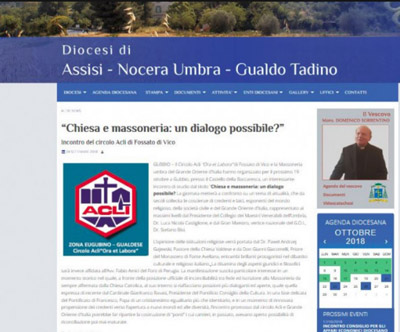 • Some journalists called the press office of the Diocese of Assisi inquiring about the event and received this response, "No, the Diocese has nothing to do with it.” When the journalists pointed out that the diocesan website had featured a news article promoting the event, the press office representative again responded: "No, actually ... no. In short, we don't know why it ended up on the diocesan site." Reportedly, a few hours after the phone call, the article on the website disappeared. At right you can see a screenshot of that article on the Diocese’s website.
• Some journalists called the press office of the Diocese of Assisi inquiring about the event and received this response, "No, the Diocese has nothing to do with it.” When the journalists pointed out that the diocesan website had featured a news article promoting the event, the press office representative again responded: "No, actually ... no. In short, we don't know why it ended up on the diocesan site." Reportedly, a few hours after the phone call, the article on the website disappeared. At right you can see a screenshot of that article on the Diocese’s website.
In an interview with Radio Gubbio, Fr. Gianni Giacomelli stated, “I think the encounter is always important … it has its own natural value. Without encounter, people cannot confront each other, they cannot understand which side they are on; they cannot even understand who they are. So, this is why I am interested in meeting both closely and at a distance, but still meeting.”
Another public conference
While I was writing this analysis, there was another development of this “dialogue.” On November 3, 2018, the same Masonic group GOI organized another public conference titled “The Relationship between the Church and Masonry,” held this time in Matera, Italy, at the Palazzo Vicecontedi.
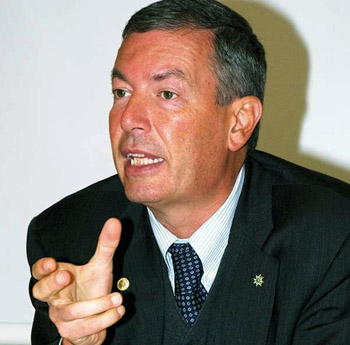 Another priest was invited to speak, Fr. Paolo Renner, director of the Institute of Religious Science of Bolzano. This time, Fr. Paolo Renner actually delivered the greetings of Archbishop Pino Caiazzo, of Diocese of Matera-Irsina. So, now we clearly move from implicit approval to explicit support.
Another priest was invited to speak, Fr. Paolo Renner, director of the Institute of Religious Science of Bolzano. This time, Fr. Paolo Renner actually delivered the greetings of Archbishop Pino Caiazzo, of Diocese of Matera-Irsina. So, now we clearly move from implicit approval to explicit support.
In an interview with Radio del Mezzogiorno, the reporter asked about the historical context when relations between the Church and Masonry improved. Fr. Renner answered: "It took place when the Church no longer had the temporal power of the past. Therefore, she had less political interests and was more on the side of man rather than one or another form of power or wealth. At the same time, even Freemasonry has set aside its anti-clerical attitudes that once characterized it so violently. I hear many criticisms when I speak with the Masons, but I think we have to learn from Pope Francis when he says that we must be normal, talking and relating to everyone because something good always comes from it." (Italian text here)
Considering all of these facts, we realize that there have been two public and collaborative meetings that push for “dialogue” between Masons and Catholics, both having the approval of the local Prelates.
What is a Catholic to make of these “encounters”? Considering that Pope John Paul II’s 1983 Code of Canon Law abolished the excommunication of Catholics who become Masons, this should come as no surprise. After Vatican II, the Conciliar Church has made many public manifestations of tolerance and friendliness towards the Masonic establishment, not only through its Popes, but also through other members of its visible hierarchy (here, here and here).
To encourage the faithful to go along with these initiatives, the progressivists employ positive terms such as “culture,” “building bridges,” “dialogue” and “encounter.” Sadly, Catholics have already become accustomed to accept these initiatives, since Progressivism has indoctrinated them to tolerate error and evil, and to hate the past militancy of the Catholic Church against her enemies. This follows the aggiornamento mentality that has been installed in the Church since Vatican II.
These public Masonic-Catholic dialogue conferences are sure to be only the first of many such “encounters” between the Conciliar Church and its new Masonic friends.
One is left to wonder: what is next? Will we have a joint Masonic-Catholic declaration like the Lutheran-Catholic Augsburg Accord? Or the installation of a Masonic monument in the Vatican, as Pope Francis did with the statue of Luther? Or will the conciliar Popes start to wear Masonic symbols? We don’t know where this will go, nor for how long this will last. Only one thing is for sure: We have to resist, be vigilant and denounce what is against the bi-millennial doctrine of the Catholic Church.


The Church & Masonry join together for an encounter in Gubbio; in his speech Fr. Gianni, below center, affirms, 'We must stop being afraid of dialogue with Masonry'

It is along these lines that a public conference was held recently on October 19, 2018, at Baccaresca Castle in Gubbio, Italy, in the Province of Perugia. The conference, titled “The Church and Masonry: A Possible Dialogue?” was a collaboration between the Umbrian Masonry of the Grand Orient of Italy (GOI) and the Italian Association of Christian Workers (ACLI), a Catholic organization. Speakers included the Masonic Grand Master Stefano Bisi, President of ACLI Sante Pirrami (from the Fossato di Vico chapter), two local mayors, Waldensian “pastor” Pawel Andrzej Gajewsi and the Catholic representative, Fr. Gianni Giacomelli, prior of the Monastery of Fonte Avellana.
Apparently, this conference met with the approval of the Dioceses of Assisi and Gubbio, manifested by these facts:
• Pirrami stated that all the local Prelates had been informed of the event; this would include Arch. Domenico Sorrentino and Card. Gualtiero Bassetti. “Were informed” means that the Prelates did not present any objections to the meeting. This is why Pirrami was bold enough to state that he “saw no reason for criticism” from anyone.
• To this day neither the mentioned Archbishops nor other Bishops have publicly condemned this conference, which confirms that it met at least with their implicit approval.
• This passive approval actually reveals itself to be an active approval, considering that the Diocese of Assisi promoted the meeting on its website. The promotional news article stated: “The event raises particular interest at a historical moment when, in the face of the official position of irreconcilability between the [Catholic] faith and joining Freemasonry, a position that has always been affirmed by the Catholic Church – there are other options. One was that expressed recently by Cardinal Gianfranco Ravasi, President of the Pontifical Council for Culture."

Screenshot of the Diocesan website of Assisi promoting the Masonic meeting
In an interview with Radio Gubbio, Fr. Gianni Giacomelli stated, “I think the encounter is always important … it has its own natural value. Without encounter, people cannot confront each other, they cannot understand which side they are on; they cannot even understand who they are. So, this is why I am interested in meeting both closely and at a distance, but still meeting.”
Another public conference
While I was writing this analysis, there was another development of this “dialogue.” On November 3, 2018, the same Masonic group GOI organized another public conference titled “The Relationship between the Church and Masonry,” held this time in Matera, Italy, at the Palazzo Vicecontedi.

Fr. Renner delivers the greetings of Arch. Pino Caiazzo
In an interview with Radio del Mezzogiorno, the reporter asked about the historical context when relations between the Church and Masonry improved. Fr. Renner answered: "It took place when the Church no longer had the temporal power of the past. Therefore, she had less political interests and was more on the side of man rather than one or another form of power or wealth. At the same time, even Freemasonry has set aside its anti-clerical attitudes that once characterized it so violently. I hear many criticisms when I speak with the Masons, but I think we have to learn from Pope Francis when he says that we must be normal, talking and relating to everyone because something good always comes from it." (Italian text here)
Considering all of these facts, we realize that there have been two public and collaborative meetings that push for “dialogue” between Masons and Catholics, both having the approval of the local Prelates.
What is a Catholic to make of these “encounters”? Considering that Pope John Paul II’s 1983 Code of Canon Law abolished the excommunication of Catholics who become Masons, this should come as no surprise. After Vatican II, the Conciliar Church has made many public manifestations of tolerance and friendliness towards the Masonic establishment, not only through its Popes, but also through other members of its visible hierarchy (here, here and here).
To encourage the faithful to go along with these initiatives, the progressivists employ positive terms such as “culture,” “building bridges,” “dialogue” and “encounter.” Sadly, Catholics have already become accustomed to accept these initiatives, since Progressivism has indoctrinated them to tolerate error and evil, and to hate the past militancy of the Catholic Church against her enemies. This follows the aggiornamento mentality that has been installed in the Church since Vatican II.
These public Masonic-Catholic dialogue conferences are sure to be only the first of many such “encounters” between the Conciliar Church and its new Masonic friends.
One is left to wonder: what is next? Will we have a joint Masonic-Catholic declaration like the Lutheran-Catholic Augsburg Accord? Or the installation of a Masonic monument in the Vatican, as Pope Francis did with the statue of Luther? Or will the conciliar Popes start to wear Masonic symbols? We don’t know where this will go, nor for how long this will last. Only one thing is for sure: We have to resist, be vigilant and denounce what is against the bi-millennial doctrine of the Catholic Church.

Posted November 7 , 2018
______________________
______________________
 Volume I |
 Volume II |
 Volume III |
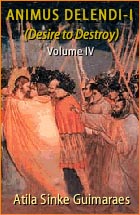 Volume IV |
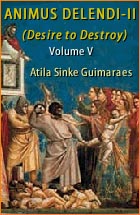 Volume V |
 Volume VI |
 Volume VII |
 Volume VIII |
 Volume IX |
 Volume X |
 Volume XI |
 Special Edition |



